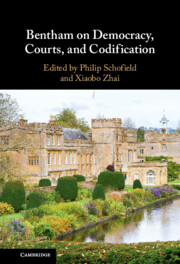Book contents
- Bentham on Democracy, Courts, and Codification
- Bentham on Democracy, Courts, and Codification
- Copyright page
- Contents
- Contributors
- Introduction
- Part I Democracy
- 1 Intellectual Aptitude and the General Interest in Bentham’s Democratic Thought
- 2 Bentham, Democracy, Free Government, and the Relationship between Rulers and Ruled
- 3 The Interests of Women in Bentham’s Late Constitutional Thought
- 4 Religion and Judgement in Bentham’s Political Thought
- 5 Organizing the Utilitarian State
- 6 Bentham on the Corruption of Democracy
- 7 The People’s ‘Greatest Misfortune’ and ‘All the Chance the People Have’
- Part II Law and the Courts
- Part III Codification
- Bibliography
- Index
5 - Organizing the Utilitarian State
The Official Aptitude of Functionaries
from Part I - Democracy
Published online by Cambridge University Press: 25 August 2022
- Bentham on Democracy, Courts, and Codification
- Bentham on Democracy, Courts, and Codification
- Copyright page
- Contents
- Contributors
- Introduction
- Part I Democracy
- 1 Intellectual Aptitude and the General Interest in Bentham’s Democratic Thought
- 2 Bentham, Democracy, Free Government, and the Relationship between Rulers and Ruled
- 3 The Interests of Women in Bentham’s Late Constitutional Thought
- 4 Religion and Judgement in Bentham’s Political Thought
- 5 Organizing the Utilitarian State
- 6 Bentham on the Corruption of Democracy
- 7 The People’s ‘Greatest Misfortune’ and ‘All the Chance the People Have’
- Part II Law and the Courts
- Part III Codification
- Bibliography
- Index
Summary
This chapter examines the way in which, in his constitutional writings, Jeremy Bentham argues for democracy as the best form of government, while also analyzing his ability to envision the organization and structure of the state. In specific terms, a central theme of Bentham’s thinking is the management of functionaries. What is their role and to what end should they be managed? Functionaries are an integral part of the utilitarian state, which, as such, must maximize its efficiency and minimize its expenditure while also ensuring the greatest happiness for the greatest number. Therefore, one can speak of the state’s primary end, which is set by the principle of utility and concerns society as a whole, and of a secondary end, still set by this same principle but that has to do with a particular group of individuals: functionaries. Consequently, the latter are actors among others in the social theatre Bentham attempts to construct.
- Type
- Chapter
- Information
- Bentham on Democracy, Courts, and Codification , pp. 110 - 133Publisher: Cambridge University PressPrint publication year: 2022

